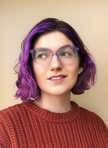Amber Morrell's Blog
December 12, 2024
Pillars of a Creative Life: Storytelling, Librarianship, Innovation, and Advocac
 Photo by Pixabay on Pexels.com
Photo by Pixabay on Pexels.comAs someone who wears many hats I often find myself at odds. For over a decade now I’ve considered this concept of defining identity rather complex. It started when my daughter was born, when I had to wrangle with the unexpected identity of motherhood. I decided early on that motherhood is not who I am, but representative instead of work that I do.
I tried to extrapolate this to my career as a librarian when I got laid off during COVID. Librarian had become my identity, but if I wasn’t engaging in library work, then who was I? In addition to the multitude of crises at this point in my life (and in the world), I also underwent a crisis of identity.
By this definition, however, I’m not a writer unless I’m writing, not a crocheter unless I’m crocheting, etc. How actively engaged in these activities do I have to be to claim their identity? Do I need to write daily, or is a few times a week enough? What if I go through a slump and don’t write for several weeks or months–am I still a writer? Is it enough to “have written” in the past?
Considering that I do so many different things, I often don’t do them all at once. Is it even possible to be librarian, writer, crocheter, D&D player, content creator, marketer, fan, mother, community member, ad infinitum, all at once? Are these identities, labor definitions, or something else entirely?
All of this is to say: who am I?You can see how this dilemma could lead to a sort of paralysis when it comes to presenting myself. If I don’t know who I am, then it is impossible to say or do things online without misrepresentation. It becomes less about who I am and what I do, and more about how I present myself authentically to others. There are many discordant things that I’m passionate about, but I find it difficult to blend them all together to create a cohesive me. Of course, inside my head they all work together seamlessly, but it’s harder to articulate that than it is to feel it.
So I haven’t. I’ve largely withdrawn from blogging and social media, and while community is still very important to me, I’ve found safe haven in smaller, less public groups. But to survive in a capitalist society as a creative, withdrawal isn’t exactly the most lucrative of choices. With this in mind I’ve given a lot of thought about how I want to present myself to the world. I’ve thought deeply about my values and the aspects of myself and my work that I want to articulate. I’ve read, to the horror of my friends and even myself, self-help books that encouraged creating these kinds of definitions.
Here’s what I came up with: four pillars that define almost everything I do. I find that most things I enjoy in life falls into one of these four categories. This isn’t my totality, of course, but I think it’s good enough for now.
StorytellingEverything I do is related to story. I see storytelling as a way to connect deeply with others. I write in order to illuminate inner truths and deeply-held beliefs. But story is also a big part of librarianship, because I thrive on connecting people to stories that are meaningful to them. I wouldn’t be here without story–the truths that live inside of me and my ability to share them in an entertaining yet meaningful way.
LibrarianshipI began working in libraries because it felt like a natural fit for someone who loves to read. However, I quickly realized that librarianship goes beyond personal reading interests. As a librarian, I connect people to resources and information that empower them to learn and grow. At its core, librarianship is about the stewardship of information—ensuring it is organized, preserved, and accessible in order to create those connections.
InnovationI wouldn’t be much of a speculative fiction writer if I wasn’t fascinated by the “what if.” I like to throw ideas at the wall and see what sticks. I’m always trying new things and new technologies to see if I can make reaching my goals more accessible. I’m not afraid to think outside the box and learn new skills to create possibilities. At the same time, I also think deeply about the ethical considerations of new technologies and the changing status-quo.
AdvocacyAt its heart, advocacy is about building community and lifting each other up. I truly believe that community is one of the most important aspects of a creative life. I’m a member of various organizations (at various levels of formality) where we support each other and take up each others’ causes. Advocacy, to me, means dedicating time, energy, and resources to the greater good of the world, not just for personal gain.
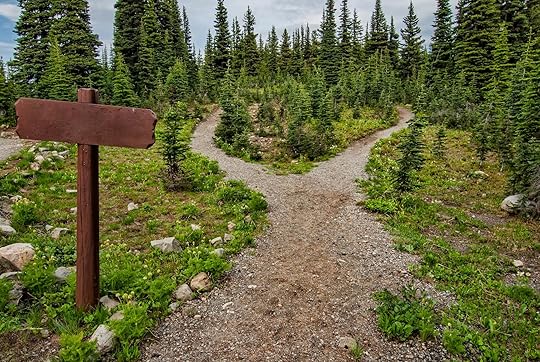 Photo by James Wheeler on Pexels.com
Photo by James Wheeler on Pexels.comI don’t believe that these four pillars, despite their name, are set in stone. But I do believe that at this point in my life, it’s important to define and clarify my values as a means to give myself a path forward, especially when it comes to shaping my personal brand. Perhaps pillars isn’t the right word for them–maybe I should have called them guideposts. I don’t know what the future holds, but at least I have a few signs pointing my way.
The post Pillars of a Creative Life: Storytelling, Librarianship, Innovation, and Advocac appeared first on Amber Morrell.
October 27, 2022
The Alchemy of Letting Go Cover Reveal + GIVEAWAY!
It’s with much excitement that I can finally reveal the cover for my debut novel, The Alchemy of Letting Go!
This book isn’t the first I ever wrote, but it’s one that’s very close to my heart. I wanted to write something that blended my love of science and of fantasy, and show that the two aren’t so different after all.
Keep reading for the official description and to see the beautiful cover! I’m also excited to announce that I’ll be giving away FIVE advanced readers copies of THE ALCHEMY OF LETTING GO! Find out how to enter below.
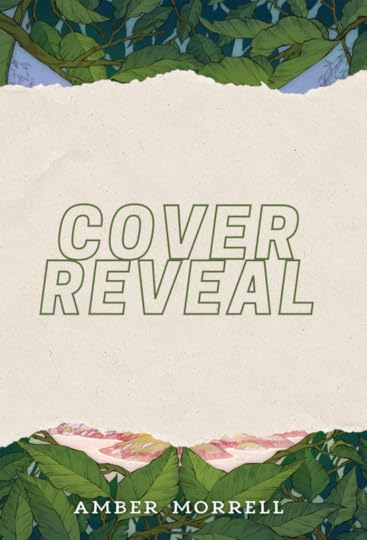
A young scientist finds a magical way to escape death, but can’t escape her emotions.
Twelve-year-old Juniper Edwards can’t stop chasing the endangered butterfly her sister died trying to catch. In her grief, Juniper finds comfort in her family’s study of insects, because science is based on logic, order, and control. But then Juniper’s search for the butterfly nearly kills her, too, and when she wakes up with newfound abilities, she discovers that the line between science and magic―and life and death―is not as solid as she thought. With the help of her mysterious neighbors, Juniper tries an experiment to change things back to the way they were. Its result will force her to face the fact that some things are way beyond her control.
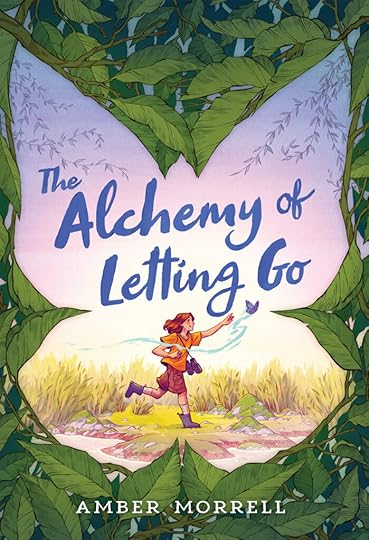
The cover was designed by Erin McMahon and Aphelandra and illustrated by James Firnhaber.
Sign up for my mailing list to win an ARC of THE ALCHEMY OF LETTING GO!Enter to Win!
Contest Rules: US only. Ends November 3rd, 2022. Winner will be notified by email. By clicking submit, you agree to share your email address with the site owner and Mailchimp to receive marketing, updates, and other emails from the site owner. Use the unsubscribe link in those emails to opt out at any time.
Processing… Success! You're on the list. Whoops! There was an error and we couldn't process your subscription. Please reload the page and try again.The post The Alchemy of Letting Go Cover Reveal + GIVEAWAY! appeared first on Amber Morrell.
August 6, 2022
Wikimedia+Libraries Convention in Maynooth, Ireland
Last month I was invited to speak at the Wikimedia + Libraries Convention in Maynooth, Ireland, a thirty minute train ride outside of Dublin. I hosted a short presentation about my experiences creating Wikipedia-based content on TikTok, as well as how library studies should be researching and utilizing short-form video as an accessible avenue for knowledge-sharing. My session coincided with a presentation by Annie Rauwerda of “Depths of Wikipedia” fame, in which she sung a hilarious parody of “We Didn’t Start the Fire.”
During the two-day conference, I learned so much about the Wikimedia Foundation and the different programs they’ve created. I’ve been a Wikipedia fan for a long time, but even I didn’t know about things like Wikimedia Commons or Wikidata, or their outreach program for librarians called #1Lib1Ref. (I really think social media can help bring awareness to these projects!) It’s also amazing the global reach that the Wikimedia Foundation has—I walked away from this convention with new friends from Australia, India, Romania, Nigeria, the UK, and more.
Here’s a photo of me with some of my new friends. Also check out the great sketched version by David Ramírez-Ordóñez.
Cool hangs in Maynooth for #WikiLibCon22 w. @satdeepgill, @depthsofwiki, @klaula, @BiblioQC, @atmorrell et al – tag yourselves if I've missed you! pic.twitter.com/Jn4vb3riJr
— Dr Lucy Hinnie (@BL_Wikimedian) July 24, 2022
After the convention I spent a few days in Dublin as a tourist. A few things I loved about the city: the weather (a nice 65 F every day, a wonderful reprieve from sweltering Southern California), the beer, and the public transportation. The food… hit or miss, to be honest. Since I didn’t have much time, I spent most of it in Dublin City Center, where I walked everywhere. My feet were sore but it was well worth it.
Here’s some of my favorite photos from the trip.
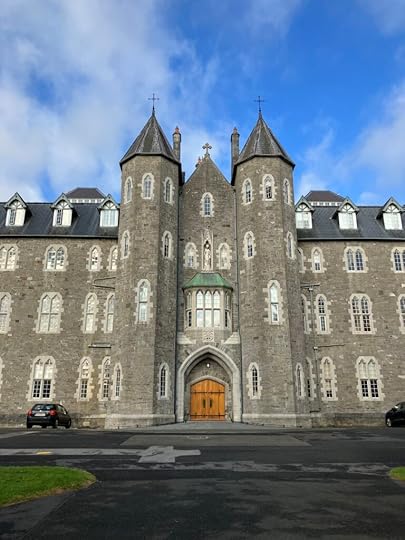 The 18th-century seminary we stayed in for the conference. My room was on the top floor.
The 18th-century seminary we stayed in for the conference. My room was on the top floor.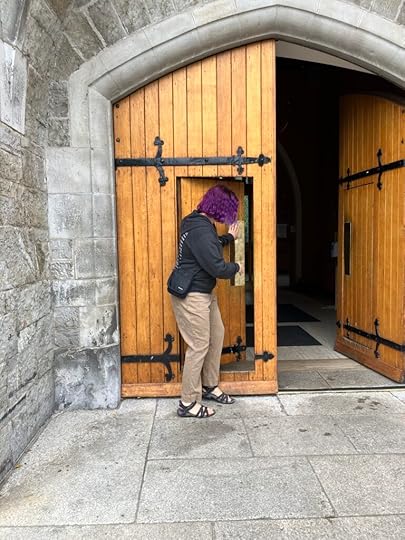 The tiny door-within-a-door we had to use when the larger doors were locked at night.
The tiny door-within-a-door we had to use when the larger doors were locked at night.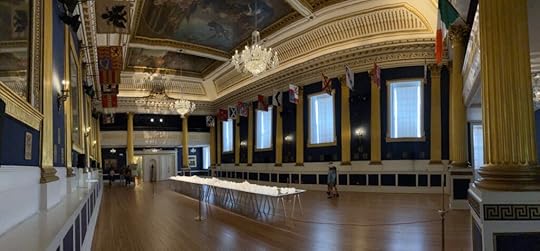 At Dublin Castle, an art exhibition of glass potatoes as a remembrance of the suffering endured during the Famine. Queen Victoria would host lavish dinner parties in this room while the Irish starved outside.
At Dublin Castle, an art exhibition of glass potatoes as a remembrance of the suffering endured during the Famine. Queen Victoria would host lavish dinner parties in this room while the Irish starved outside.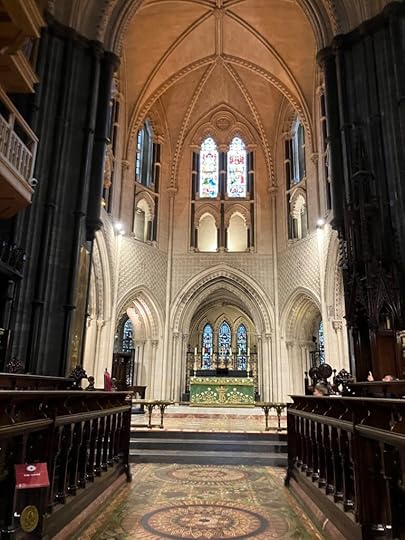 Christchurch Cathedral, which I visited solely for its description on Google Maps: “Medieval place of worship with a mummified rat & cat plus a cafe and gift shop in the crypt.” I did see the mummies, which I won’t post here because they’re rather gruesome, but you can find pictures online.
Christchurch Cathedral, which I visited solely for its description on Google Maps: “Medieval place of worship with a mummified rat & cat plus a cafe and gift shop in the crypt.” I did see the mummies, which I won’t post here because they’re rather gruesome, but you can find pictures online.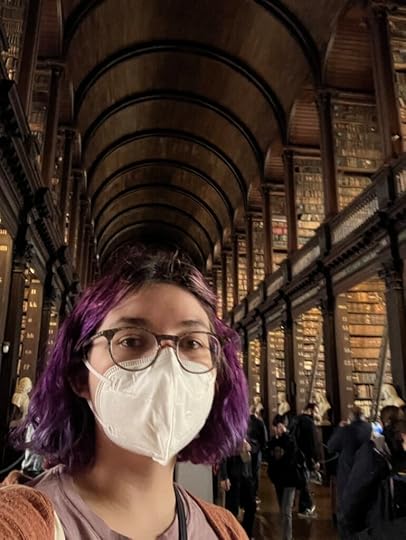 Of course I had to visit Trinity College to see the Book of Kells and the Long Room! The Long Room was breathtaking.
Of course I had to visit Trinity College to see the Book of Kells and the Long Room! The Long Room was breathtaking.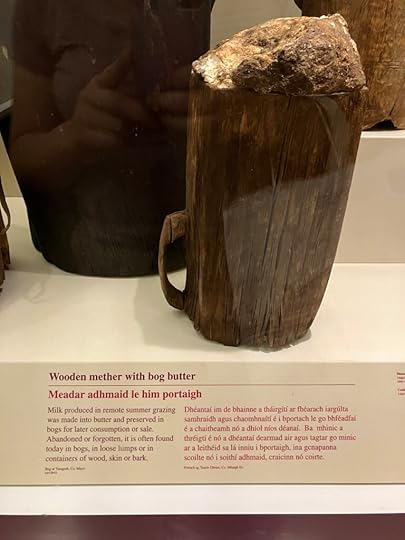 I visited the National Museum of Archaeology and learned about bog butter; probably my favorite cursed fact from the trip.
I visited the National Museum of Archaeology and learned about bog butter; probably my favorite cursed fact from the trip.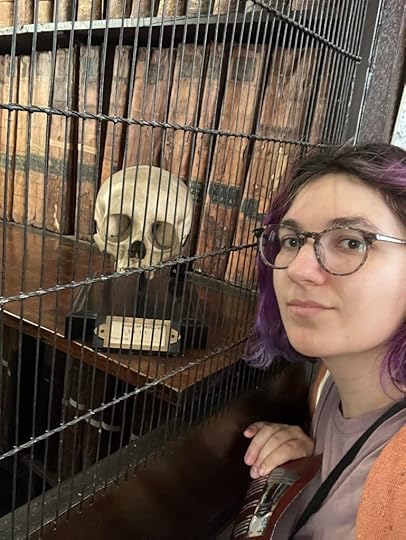 Made a friend at Marsh’s Library, the oldest public library in Ireland. Unsurprisingly, I ran into not one, but two visiting librarians here.
Made a friend at Marsh’s Library, the oldest public library in Ireland. Unsurprisingly, I ran into not one, but two visiting librarians here.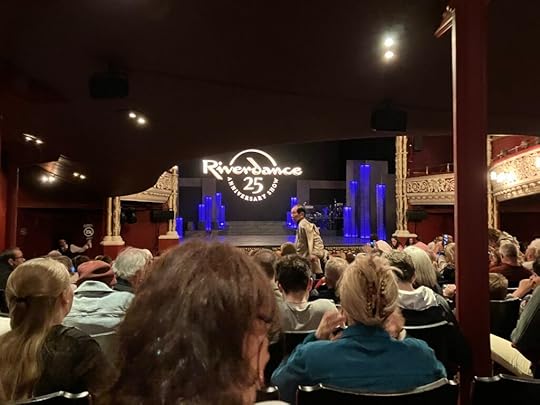 Saw Riverdance live at the historic Gaiety Theatre, which was absolutely beautiful.
Saw Riverdance live at the historic Gaiety Theatre, which was absolutely beautiful.I also saw two different drag shows. Dublin is a very queer-friendly city! I hope to be able to visit again one day.
The post Wikimedia+Libraries Convention in Maynooth, Ireland appeared first on Amber Morrell.
June 18, 2022
“Growing Up Magical” at the 2022 Nebula Conference

Last month, I was invited to speak at the virtual 2022 Nebula Conference. The Nebula Conference is hosted every year by Science Fiction and Fantasy Writers of America (SFWA), one of my favorite professional organizations.
I spoke on the “Growing Up Magical” panel alongside the amazing authors Darcie Little Badger, Elisa A. Bonnin, Leslie Vedder, and Lisa Stringfellow. We discussed magic and magic systems in children’s fiction.
Though the panel is over, you can view the recording with a conference membership through April 2023. You’ll also have access to dozens of other amazing panels from the conference!
The post “Growing Up Magical” at the 2022 Nebula Conference appeared first on Amber Morrell.
September 1, 2021
Debut Novel Acquired by Albert Whitman
I have some exciting news! My debut novel, The Magic Method, has been acquired by Albert Whitman & Co. for publication in Spring 2023.
You can find more details about the book and read the official announcement here.
I’m very excited to work with Albert Whitman and especially my editor, Nivair Gabriel, who understands this book and my vision even better than I do.
The post Debut Novel Acquired by Albert Whitman appeared first on Amber Morrell.
January 2, 2021
Author Visits in the Time of Remote Learning
Back in October, I wrote an article about virtual author visits for the Society for Children’s Books Writers and Illustrators blog, Kite Tales. In that article, I offer some new models for authors engage with schools, libraries, and bookstores virtually.
With COVID cases rising, adapting to virtual technologies is more important than ever. While traditional author visits aren’t possible, there are a lot of opportunities for authors to connect with their audiences. Many of the technologies surrounding school and library visits are woefully outdated anyway, and authors need to think outside the box in order to make themselves more accessible–even after the pandemic has passed.
Click here to read the article on the Kite Tales Blog.
If you write for children or young adults, consider joining SCBWI. They have a lot of great resources for authors, and I’ve enjoyed several of their regional (pre-COVID) conventions.
Want to know more? Sign up below for exclusive details and updates.
Join my email list
By clicking submit, you agree to share your email address with the site owner and Mailchimp to receive marketing, updates, and other emails from the site owner. Use the unsubscribe link in those emails to opt out at any time.
Processing… Success! You're on the list. Whoops! There was an error and we couldn't process your subscription. Please reload the page and try again.The post Author Visits in the Time of Remote Learning appeared first on Amber Morrell.
December 30, 2020
How I Built My TikTok Platform
As a writer, I’ve spent years trying to build a “platform.” You hear it time and again: if you want publishers to invest in you, they need to know that you can build and maintain an audience. They want to publish books by authors with a built-in fan base. Follower counts on Instagram and Twitter often equal dollar signs for them.
As a result, I invested a lot of time into Twitter. Twitter seems to be the place where other authors hang out, so I’ve been diligent about forging connections with other writers there. When I meet people at conferences I make sure to follow them. I try to tweet timely comments with relevant hashtags. I make sure to interact with authors I admire.
I have about 2,500 followers on Twitter, which isn’t big-time by any means but was something I was a bit proud of. It took me about five years to reach that number, and I get pretty good engagement on my tweets.
The only problem with Twitter is the platform itself. Like Facebook, using it has become a depressing slog. Like many others, I use Twitter to vent about my life in addition to making writing-related quips, and since 2020 has been a particularly awful year for most, my Twitter feed has matched that mentality. It’s hard for me to spend more than a couple minutes a day on the site anymore.
Throughout the pandemic, there’s one platform that I’d become increasingly reliant on for a daily serotonin boost: TikTok.
TikTok is hailed as being the social media of Gen Z, and as such, I didn’t actually download it until January 2020, after my teen volunteers at the library tried recording a group Renegade dance before storytime. I went home that day and downloaded it, and became instantly hooked on the customer service stories, D&D memes, and cat videos.
For months, TikTok was my ultimate escape. Where else could I get an endless stream of drag queen transitions, Doug Dimmadome hats, and Waluigi twerking to WAP? Somehow their algorithm pinpointed my exact sexuality and showed me videos of people who had the exact same experiences with anxiety that I did.
There’s a lot of criticisms of TikTok’s ownership and their algorithm, but that’s neither here nor there for the purposes of this post. TikTok is one of the things that kept me sane in 2020.
Backing up a little bit to trying to create a platform for writing purposes. One of the things I always meant to do but never really had the stamina or drive for was blogging. I have a few writer friends who are fairly successful bloggers with a steady readership, and it always seemed to be an appealing and appropriate way to build an audience. After all, what better way to showcase your writing ability than to have a long, regularly updated body of work exemplifying it?
My biggest issue was deciding what to blog about. I’ve always felt that blogging about writing was a bit overplayed, and I don’t think I have anything new to say on the topic. But something I’ve always enjoyed, as both a librarian and a writer, is learning new, random information. So on December 6th, 2020, I posited this question to my Twitter following.
Hey writer mutuals, would anyone be interested if I started blogging about the weird Wikipedia rabbit holes I fall down?
— Amber Morrell
I fall down them often and want to scream about it to the void.has a book announcement! (@atmorrell) December 6, 2020
This received a fairly warm reception from, well, three people. But my good friend Eddie Louise suggested this:
You should tik-tok em!
— EddieLouise is(@EddieLouise) December 6, 2020
At first, I was hesitant. While there is educational content on TikTok, to be honest, I never really watch it. Furthermore, I was worried that I had too much to say than would fit in a one minute video. But after thinking on it and realizing that blogging has limited reach and YouTube editing takes way more time than I’m willing to invest, I decided to post my first video on December 7th.
@storytimeamberIt’s easy to get lost in Wikiland. Let’s learn about the Antikytheran Mechanism! #greenscreen #librariansoftiktok #wikipedia #aliceinwonderland #fyp
♬ original sound – Amber Morrell
I sent this video to about five people, and for the first twenty-four hours, I had a grand total of 20 likes. That seemed promising, however, so I decided that I’d make a few more videos and see how it went.
But something changed the day after I posted the video.
My notifications on TikTok started to climb. I was suddenly getting a lot of followers very, very quickly. In about two hours, I gained about 1200 followers.
Twenty minutes later, I had nearly 2000.
If I get more followers on TikTok in 24 hours than in the entire eleven years I’ve been on Twitter I’m going to lose my god damn mind.
— Amber Morrellhas a book announcement! (@atmorrell) December 9, 2020
By 6:30pm, I had over 10,000 followers. It’d been just over twenty-four hours since I’d posted the video, and I already had five times the amount of followers I’d spent eleven years gaining on Twitter.
But this was just the beginning. I was going viral.
As I sat down to dinner, I was gaining about 100 followers per minute. By the time I went to bed, I had 40,000 followers. When I woke up the next morning, I had 65,000 followers.
It has been three weeks since that video went viral, and I continued to make videos in the same vein—random did-you-know facts based on Wikipedia articles or other various places on the internet. I now have 31 videos total (although some of them are responses to comments I received) and 185,000 followers. I haven’t been able to replicate the success of that first video. Some videos seem to get picked up and get over 100,000 views. Some that I thought would do well languish and die with under 10,000 views.
And the thing is, I have no idea what the difference is. Is it the color of my sweater? Is it the way I present the subject matter? Is it the subject itself? What causes the algorithm to pick up my videos and show them to a ton of people, or to let them lie there, ignored?
I haven’t figured it out and I am not sure I ever will. But there’s one thing that I know for certain, and this is what I want you to walk away with: my success was not connected to my effort.
After all, I’d spent years of effort trying to build a Twitter following and got very little for it. But a one minute video, in which I summarize a Wikipedia page, that only took me an hour to make, took off. Clearly, effort is not connected to success.
But I do think this success demonstrates a few key points.
There are more consumers on TikTok than producers, so it’s easier to viral than other places.TikTok was the number one downloaded app in 2019 and is on track to hit the same record in 2020. Despite its political contention, it’s no secret that it’s the hottest social media around right now. But because it’s so new, there are a lot of opportunities to build a following there compared to other social media platforms that are already pretty saturated.
It’s okay to throw things at the wall until something sticks.As I’d mentioned, I’d already tried Twitter. I’ve tried blogging, tried offering writing classes, tried Facebook groups, tried Instagram—I’ve tried a LOT of things. And what works for one person might not work for another. But what’s important is to keep trying, get your fingers in every pie, and spread as broad as you can until you hit the right nerve.
You don’t need to be perfect.Don’t wait to have the right conditions, the right equipment, the right look. As long as you are passionate about what you’re making, that’s enough. That video that has 2.5 million views? I’m literally sitting in my bed, not wearing makeup, talking about Wikipedia. I don’t have a fancy mic or camera setup and I don’t have the “look” of some beautiful influencer. I’m just me, and my audience is okay with that.
And yeah, people have made comments about my appearance, both positive and negative. That’s not an easy pill to swallow, but I’m learning to ignore it. And my husband got me this great, thematically-appropriate mug for Christmas.
 A mug that says, “Comments have been disabled.”It is all completely out of your control.
A mug that says, “Comments have been disabled.”It is all completely out of your control. I can’t control how many people see or comment on my videos. The only thing I can really do is keep making them and hope that the audience translates to my other presences online. There’s a lot of luck and hope involved, and I don’t think videos being unpopular means they are bad videos—it just means they didn’t check the ineffable boxes of The Algorithm.
So, what’s next? I’m going to keep making videos, and keep writing, and hope that a publisher sees nearly 200,000 followers as a “platform.” After all, the point of the “platform” is not to be TikTok famous, but to have a way to connect to potential readers and to have a clearer avenue to publication.
Have you found success on TikTok? I’d love to hear about your experience in the comments.
Want to know more? Sign up below for exclusive details and updates.
Join my email list
By clicking submit, you agree to share your email address with the site owner and Mailchimp to receive marketing, updates, and other emails from the site owner. Use the unsubscribe link in those emails to opt out at any time.
Processing… Success! You're on the list. Whoops! There was an error and we couldn't process your subscription. Please reload the page and try again.The post How I Built My TikTok Platform appeared first on Amber Morrell.
May 18, 2020
How I Found My Agent
When I wrote my post about being on submission, I realized I’ve never shared the story of how I got my agent. You’ve probably heard that there are a lot of different paths to getting an agent or getting published. The most common is to send agents query letters until you find one who connects with your book. This was the path I’d intended to take, but reality played out a bit different.
I wrote a novel in November of 2015 as a NaNoWriMo project. I’d written many novels before this, but this was the first one I’d written with the intention of revising and publishing. It was around this time I discovered book Twitter, MSWL, and all the other resources out there for aspiring authors, and so it was the first time I had a serious go at publishing. After I finished drafting, I began to revise—and trust me when I say that that book was a trash fire at first and needed a lot of revision.
As part of this whole “taking myself seriously as a writer” thing, I attended my very first conference—the 2016 AWP conference, which happened to be in Los Angeles that year. I bought a student membership and stayed at my aunt’s house about twenty minutes away. That conference showed me the value of conferences, not necessarily for finding agents but for its networking potential.
Before the conference, I heard on Twitter about an off-site Kidlit meetup, and decided to crash it. I bought myself two glasses of wine and decided to talk to every single person. This took a lot of courage because before this event, I considered myself an extremely shy and anxious person. I still do, in many respects. But I told myself I might not have an opportunity to network like this again—after all, the conference is in a different city every year—so I forced myself to talk to people.
I met a lot of really awesome writers, some of whom I’m still friends with on Twitter. This is where I got added to some really amazing Facebook groups, which have made a big impact on my career because of the support they provide and are honestly the only reason I still use Facebook. But the big connection I made was with the editor of a small press. He asked me to pitch him my book (I never pitched it without being invited to, because that felt tacky, but I did have an elevator pitch prepared). He asked me to submit it to him when I was done revising, and I connected with him on Facebook and Twitter.
I spent the next year revising my novel (most of that time spent procrastinating revising my novel, but you get the idea). Sometime in spring of 2017, he posted that his small press was open for submissions. I finished revising as quickly as I could and sent it in.
And then crickets. I graduated college in spring of 2017, so I was very busy. I got my first post-college job as a library assistant, which is still my current job. I didn’t write much until that November, where I wrote the first draft of what would eventually become MAGIC BOOK, which is now done and on submission.
In December of 2017, in that weird week between Christmas and New Years, the editor of the small press sent me an offer letter. He wanted to publish my book, with revisions, at his small press. He sent me a contract.
It’s an understatement to say that I was freaking out. This was it! I was finally going to be published! My career was going to take off!
But wait. I’d done enough internet research about publishing to realize that I can’t just sign the first contract put in front of me. I’d always wanted an agent, and I realized that already having a publication offer gave me a leg up in my agent search. I consulted those Facebook support groups and crafted a query letter with a big ol’ OFFER OF PUB in the subject line. And I waited.
The great thing about already having an offer from a publisher, even a small one, is that agents paid attention. I think I queried a total of seven agents—a fraction of what people usually query—and got two agents that read my book and offered me representation within a few weeks. Ultimately, I signed with my current agent, Travis.
Now remember—this all happened in the first few months of 2018. It’s 2020, and I still do not have a book deal. So what happened?
After signing with my agent, he consulted the other agents at his agency and told me that the contract I received from the small press wasn’t the greatest. There was no advance, first of all, and no guarantee that I would ever make money off my book if it was published with them. He gave me a choice: he would represent me and shop my book elsewhere, or I could walk away and sign with the small press.
Ultimately, I chose to sign. I talked about this in my last post, but that first book never did sell to another publisher. However, as an agented author I have a lot more resources at my disposal and a lot of hope for my future. And that book might not be dead—it can still sell in the future, but I’ve moved on to other projects in the meantime. There’s obviously no way of knowing how my life would’ve played out if I did publish my book with the small press. There are many authors who are published with small presses and have wonderful careers. But I didn’t feel like it was the right choice for me. If you’re ever faced with a similar choice, you may decide differently!
So that’s how I got my agent. It was a very roundabout way to get one, but a lot of things in publishing are. I find it helpful to read about all the different paths, because if you hyper-fixate on doing something just one way, you might shut yourself out of new opportunities. I definitely have a “plan” I try to follow, but I’m also flexible and try to keep an open mind. Especially with a global pandemic going on, no one really knows what the state of publishing will be like in six months, a year, or five years from now. The only thing I can do is keep writing, and keep moving forward.
The post How I Found My Agent appeared first on Amber Morrell.
May 11, 2020
Going on submission… again!
Last week, my agent informed me that my most recent book—which I’ve been calling, descriptively, MAGIC BOOK, to avoid the risk of getting too attached to a title I may have to change—will be going on submission to editors. This is exciting! But it also elicits a lot of conflicted feelings for me. But first…
What does it mean to go on submission?
A writing career is a series of submitting your work again and again and again and again until eventually it is book-shaped. At least, that’s how I’ve begun to see it. When I first started writing novels, my big goal was to land an agent. That seemed like the ultimate success, the one thing that would launch me on a path to greatness. Get an agent and then it’s easy sailing from there, I told myself! It turns out getting an agent is just the beginning. There is still a LOT of submitting that happens after that. And a lot of waiting.
Every agent does things differently, but in general, after you sign with an agent and you complete any edits they want you to do, your agent will submit your book to publishers. This is called “being on submission” or “on sub.” Much like how authors query one agent at an agency, agents will submit your book to one editor at a publishing house. The big difference is that your agent will already have a relationship with those editors, so your novel is less likely to end up in the trash heap. The editors will probably (hopefully) read your novel.
Unfortunately, this can be an extremely long process and still doesn’t guarantee your novel will become a book. Hence my conflicted feelings. It’s hard to feel excited about going on submission.
Why? Because my first book—the book that landed me my agent in the first place—never sold.
I signed with my agent in February of 2018 (which is a long and strange story that I wrote about here) and went on submission shortly after. My agent sent me lists of editors at huge publishing houses, and I thought, this is it! This is the beginning of my career! All I have to do is wait!
So I started waiting. A lot of things happened in my life while I was waiting—I started and dropped out of grad school, my mother-in-law passed away, I moved to a new apartment. I didn’t start writing another book because I was waiting to see what would happen. I waited. And waited. And waited.
And it turned out, nothing would happen with it. I got a lot of feedback from the editors who read it but didn’t want to acquire it for one reason or another. One editor said she loved the voice but didn’t like the plot. Another editor said she loved the plot but didn’t like the voice. Too dark, not dark enough. No room on the list for a book like this. Etc. etc.
I asked my agent if I should revise, but since the feedback was so conflicting, it was clear it was a matter of personal taste. My agent told me to write another book.
At the time, I was devastated. It’d taken me three years to write this first book and I had nothing to show for it. It was another heavy weight on my shoulders after a year of heavy weights. I’d lost a few good friends along the way, too, and I felt like a complete failure. And the worst part was that I hadn’t written a single thing in at least six months (that was the biggest mistake).
You can see how this was an extremely discouraging process. I’d spent years dreaming about getting an agent, and then I was stuck in this weird limbo. Agented but not published. I was terrified that I was going to fail before I even got off the ground as an author. I joined some Facebook support groups, which helped, but I still had a hard time writing.
This was a really tough period of my life. But in 2019 I attended a few conferences that really helped me overcome this. I attended a local SCBWI conference, as well as the SFWA Nebula conference. These two—especially the latter—changed my perspective on myself as a writer. When you interact with other authors who take you seriously, you start to take yourself more seriously. I talked to a lot of people who got excited when I talked about my novels and encouraged me to keep going. This sense of community is now an invaluable part of my experience as a writer. Without it, I’m afraid I would’ve given up.
But I didn’t! Last year, I wrote another book. Well, rewrote another book. I repurposed an old NaNoWriMo draft and rewrote it from scratch. That became MAGIC BOOK. I’m really proud of it. I finished the draft in about five months, then spent another three months revising. Most of that three months was spent procrastinating revising, but I eventually finished it. I sent it to my agent in March, and as of last week, we are officially on submission with editors.
This is exciting but, as I explained above, also nerve-wracking. I’m excited because I’m proud of this book and I hope it connects with editors more than the last one did. Knowing that a bunch of people are reading your book is also a really cool feeling.
But I’m nervous, too. After all, my last book was on submission for a long time and it didn’t sell, so it’s hard to be hopeful about this one. The disappointment before was crushing, and I’m trying not to get my hopes up too high. I don’t want to feel that way again.
Then there’s the whole COVID-19 situation. Editors are being laid off en-mass, which means many of my agent’s contacts are out of jobs. The entire submission process, already complicated, is now up in the air. It’s not a good situation for anyone, and I empathize with those who’ve lost their jobs. I’ve been out of work, too, which is another difficult thing for me emotionally that I won’t really get into right now.
I don’t want to be all doom and gloom, though. Being on submission is exciting! And if nothing else, I feel resilient—I wrote a book, it didn’t sell, and I could’ve given up but I didn’t. I wrote another book. And if this one doesn’t sell, well, I’ve already started writing another. For anyone going on submission for the first time, my biggest recommendation is to keep writing. Even if you just write for fun and it doesn’t turn into a book, do something. Don’t just wait around. Even if your book sells quickly, or sells at all, you’ll still need to write another thing eventually, so you might as well get started.
In the process of writing this post, I realized there’s a lot of other things I can talk about on this blog. I’m feeling inspired to keep writing here and share more about my writing journey. If there are any topics you’d like me to talk about, let me know in the comments.
More soon!
The post Going on submission… again! appeared first on Amber Morrell.
May 8, 2020
The Wall of Fear
Whenever anyone asks how I started writing, I think back to the beginning. My answer usually has something to do with fanfiction, or with sitting at my computer screen with one of Meg Cabot’s books propped open in my lap to use as a model. Sometimes I talk about the hours I spent roleplaying on the Neopets forums, or the life-changing experience of studying creative writing at an arts boarding school for my last two years of high school.
Whichever way I slice it, writing has been an important part of my life since middle school. I’ve wanted to be a writer for as long as I can remember, and every decision I’ve made in my life has led me closer and closer to that goal.
But as I gained more knowledge and experience about the craft and business of writing, something happened that I didn’t realize. I put up a wall of fear around myself. Rather than writing for the thrill of creating something new for the world, I’ve become a nervous writer: I don’t tend to talk about what I’m working on; I have a hard time taking myself seriously; I think constantly about whether what I’m writing will sell, or if it’s worth it; I rarely think anything I write is any good at all. It is a wall of fear and self-doubt that I wear like a comforting blanket so that I avoid doing any sort of writing work at all. Writing’s become work, a strain, a struggle, something that needs to be dragged out of me kicking and screaming.
I know I wasn’t always this way. It happened gradually, little invisible doubts and fears piling up on themselves without my knowledge. It’s only now that they’ve congregated around me in such large numbers that I’m starting to notice them.
I might never have noticed them if I hadn’t been working on cleaning out my old room at my parent’s house. We’ll be moving in with them this summer, which means the various boxes of books and memories need to be gone through and consolidated and sent away to storage. One of these boxes was a box I packed hastily when I moved out of my dorm at the end of my senior year of boarding school. Not being anything immediately useful, like clothes, it was never unpacked. It was filled with photos I’d had pinned to the walls, as well as a stockpile of old schoolwork. I found science notes stacked with old poetry homework and several copies of stories I’d written for a fiction workshop.
I haven’t written a short story or a poem since I left high school. I’ve always had the intention of being a novelist—of taking characters on a long, long journey, so that when you reach the end, the characters are so dramatically changed you look back on the beginning with a sense of nostalgia. That’s something that’s difficult to attain in a short story. And in a poem—forget it. I only took poetry classes because they were part of the creative writing package. It was never something I took great pleasure in writing.
But as I read through sheaves of old prose and poetry I’d written and promptly forgotten about, an odd realization dawned on me. Seventeen-year-old Amber knew less about writing than I currently do. She’d read fewer books on crafting plots and characters, she’d never been to a conference, she didn’t have an agent—heck, she hadn’t even written a full novel.
But the most important thing she didn’t have was the wall of fear. She wrote as if she knew she was the best writer in the world. She wasn’t worried about whether these stories would sell. She wrote as if she were saying, Look at this. Aren’t you impressed? It’s good, isn’t it? She wasn’t afraid to try new things, to push boundaries, to write and show it off. She didn’t worry if the things she said were worth saying—she just said them with confidence, threw them out into the world and didn’t look back.
These days, I don’t write short stories. Hell, I don’t even blog. I’m constantly worried about what other people will think (that old self-doubt drilled into me from childhood) or whether what I’m doing is good enough. I’ve surrounded myself with a paralyzing wall of fear that’s prevented me from moving forward.
The worst thing about this wall is that it’s invisible, and it’s incredibly persuasive. It convinces me not to turn something in yet because it’s not ready, it could be better. It stamps down ideas I have before they’ve turned into anything, because it tells it me won’t be good enough before I’ve even tried. And in the process of doing all this, it convinces me that these are rational, logical conclusions—that I should be proud of myself for being responsible and revising again, or that it’s a good thing I didn’t speak my mind on a topic because someone might disagree with me and then I’ll be in trouble. The wall of fear convinced me it was a safety blanket, when really it cut me off from my dreams, my goals, and I what I really, truly want.
If you’re reading this, then maybe you have a wall of fear of your own. Maybe you’re looking for ways to dismantle it, and to write with the confidence a teenager with a world of possibility in front of her can write. I hate to disappoint (another self-conscious fear attributed to my childhood), but I don’t have the answer. Not yet, anyway. But I hope that by becoming aware of this wall of fear, and consciously making an effort to not be afraid, I begin to rebuild my confidence and take it apart bit by bit.
And hey, I wrote this and put it out into the world—it’s just one crack in the wall, but it’s a start.
The post The Wall of Fear appeared first on Amber Morrell.

